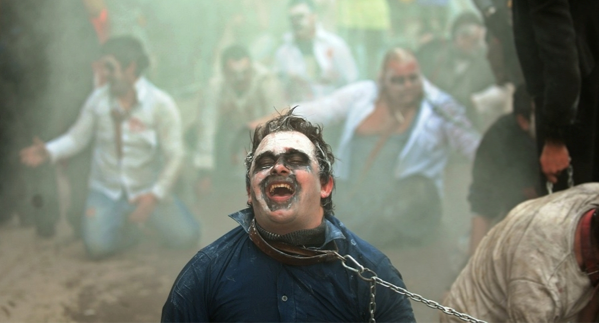By guest correspondent Chris Gilbert
It is difficult to remember that times of chaos can also be times of clarity. Let me put it differently: it is easy to forget, amidst endless reports of political turmoil, that we are in a season of carnival. Above is a photograph from the 2011 Vevcani Carnival in the Republic of Maceodnia.
The image typifies the comic spectacle of the carnival tradition: the flouting of everyday decorum, the licensed (and licentious) freedom of excess, the transformation of violence into grotesque sport, and the unhampered celebration of sarcasm, irony and satire, all of which define the “carnivalesque” and defy the “seriousness” of officialdom. The caption indicates “[a] disguised reveler…in a carnival procession.” Considering the leather strap embracing his neck, the idea of revelry is jarring. Of course, the frontal angle levels our perspective and invites us to view from within the procession and, despite the obvious and potentially repulsive nature of the man’s captivity, let alone his grubbiness, we are drawn in by the gaping grin on his face. He laughs, but we get a sense that, if he can laugh at his own imprisonment, so can we.
Although the background is a blur, we can see that everyone is reveling—even, presumably, the erect figure in black who is barely visible and who likely clutches the chain linking the loose collars around the men’s necks. A man on his knees gestures at an unseen audience member (a child, perhaps?). A huge man, who evokes the giant Gargantua himself, balances his girth in glee. Together, they reveal a wending procession of interconnected actors and in it we find a peculiar ritual performance, reliant on an equally peculiar logic of liberation. But in all its debasement, in all its irony, it depicts a certain peace. Citizenship, which is defined by at least some measure of restraint (if not constraint), is momentarily defined by the erasure of boundaries. Individual bodies merge into a larger collectivity, and the tensions that build up and beg for release are expelled. Furthermore, bodily expressions and social excesses are given time and space to simply be.
This is not to say that carnival is free from political consequence, or that it affords itself the luxury to simply watch without being watched. Everyone in the village participates, and, as SETimes notes, “[o]ne of the main parts of the carnival is to act out the major news of the past year.” As such, carnival mocks prohibition, terror, authority, violence, but only insofar as life and death are metaphors for hope and renewal. At the end of carnival, shackles are removed. Mimicked pain dissolves into relief. And true (at least metaphorically) to carne vale, people bid “farewell to flesh.”
It is said that the Vevcani carnival owes much of its popularity, not only to the actors, but “to numerous journalist teams, cameramen, and photo reporters.” It is telling, then, that there is such a relative dearth of carnival images in U.S. popular media. Perhaps we in the U.S., think of carnival only as Mardi Gras or the popular cruise line. Still, many civic carnival traditions persist. Few, however, retain the customary excesses of Vevcani and its 1400-year history. We might ask ourselves then: are we too overtaken by the “serious”? Shouldn’t carnival be an important aspect of civic life? Donning their masks and costumes, many carnival participants say they become themselves while in character. Perhaps we under-value the clarity that might come from more carnivalesque ways to commune.
Photo Credit: Robert Atanasovski/AFP/Getty Images.
Chris Gilbert is a graduate student of rhetoric and public culture in the Department of Communication and Culture, Indiana University. He can be contacted at cgilbie@gmail.com.

Nicely written piece. Academic-speak for saying “Hey, don’t worry: these crazy festivals make us better citizens!” Might be a tough sell to the more conservative traditionalist, though, but no surprise there. I think we have a lot of work to do in making the case that citizenship can benefit from periodic forays into the aesthetics of counterculture. Perhaps an immunization model might work – carnivalesque as cultural flu shot?